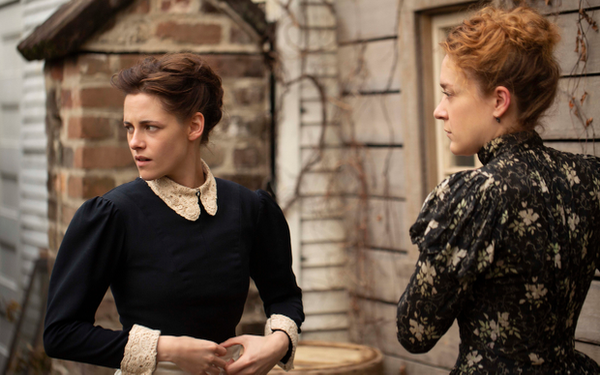Movie review by Greg Carlson
Director Craig William Macneill speculates on the infamous legend surrounding Massachusetts murder suspect Lizzie Borden in “Lizzie,” a long-germinating labor of love for star Chloe Sevigny. Working from a screenplay by Bryce Kass, Macneill’s stylish direction will satisfy a good cross-section of true crime fans as well as admirers of Sevigny and Kristen Stewart, who plays live-in Irish housemaid Bridget Sullivan. The continuing cultural fascination with the gruesome deaths of Lizzie’s father Andrew and her stepmother Abby have inspired a number of other dramatizations, including the 2014 Lifetime movie “Lizzie Borden Took an Ax” and the accompanying 2015 eight-episode series “The Lizzie Borden Chronicles,” both starring Christina Ricci.
Because Borden was acquitted of the crime, all of the literary treatments of the events surrounding the August 4, 1892 killings rely to a significant degree on purely imaginative constructions of character personalities, suspects, motivations, and conversations. Macneill’s version leverages several theories, including the speculation of Ed McBain and others that Lizzie and Bridget were involved romantically with each other. Kass’ script also taps markers from the historical record, including the absence of blood on Lizzie’s clothing, details of the hatchet handle in the murder house basement, the role of Lizzie’s maternal uncle John Morse (played to perfection by the great Denis O’Hare), and possible reasons for the presumed gap in time between the death of Abby (Fiona Shaw) and Andrew (Jamey Sheridan).
The movie combines aspects of the procedural with horror notes, burnished by Noah Greenberg’s superb cinematography and Jeff Russo’s unsettling score. “Lizzie” sides most sympathetically with its title character, casting the domineering and miserly Andrew as a monstrous sexual predator whose frequent nocturnal visits to Bridget’s bedroom are known to the other inhabitants of the household (disturbingly conveyed in one of many instances of the film’s tremendous handling of sound design). Andrew’s unforgivable actions as a rapist motivate and justify Lizzie’s hatred of her father, leading to an intense set-piece showcasing the axe-bludgeoning with definitive, all-in fervor.
Several critics have been strangely dismissive of the way in which “Lizzie” happens to align with the ongoing interest in rape culture, especially as referenced in the contemporary exposure of men abusing their power to manipulate, control, and assault women. Others, like Leslie Felperin in “The Hollywood Reporter,” argue that the movie “carves out of the raw material a suitably 2018 version, befitting of the #MeToo generation.” While I enjoyed the Lizzie/Bridget take on the mythology, parallel disagreements over the effectiveness of Sevigny and Stewart indicate another source of the decidedly mixed reactions to the film.
Certainly, the challenge of presenting the Lizzie Borden story as historical fiction rests outside the margins of the most solid of corroborated facts. What did Lizzie’s older sister Emma (Kim Dickens) know, if anything? Andrew’s refusal to electrify his house or install indoor plumbing have often marked him as an eccentric tightwad, given the man’s personal wealth. But some Borden historians, like Michael Martins, would argue that Andrew’s frugality was “no different than the other men of his age.” To this day, the crime remains officially unsolved, and “Lizzie” will not be the last movie to fantasize about the possibilities.
